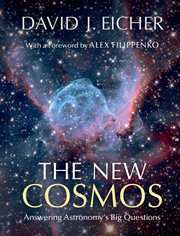Book contents
- Frontmatter
- Dedication
- Contents
- Foreword
- Preface
- Acknowledgments
- 1 The awakening of astronomy
- 2 How the Sun will die
- 3 The end of life on Earth
- 4 How the Moon formed
- 5 Where has all the water gone?
- 6 Why did Venus turn inside-out?
- 7 Is Pluto a planet?
- 8 Planets everywhere…
- 9 The Milky Way as barred spiral
- 10 Here comes Milkomeda
- 11 The Big Bang's cosmic echo
- 12 How large is the universe?
- 13 The mystery of dark matter
- 14 The bigger mystery of dark energy
- 15 Black holes are ubiquitous
- 16 What is the universe's fate?
- 17 The meaning of life in the universe
- Glossary
- Bibliography
- Index
11 - The Big Bang's cosmic echo
Published online by Cambridge University Press: 05 December 2015
- Frontmatter
- Dedication
- Contents
- Foreword
- Preface
- Acknowledgments
- 1 The awakening of astronomy
- 2 How the Sun will die
- 3 The end of life on Earth
- 4 How the Moon formed
- 5 Where has all the water gone?
- 6 Why did Venus turn inside-out?
- 7 Is Pluto a planet?
- 8 Planets everywhere…
- 9 The Milky Way as barred spiral
- 10 Here comes Milkomeda
- 11 The Big Bang's cosmic echo
- 12 How large is the universe?
- 13 The mystery of dark matter
- 14 The bigger mystery of dark energy
- 15 Black holes are ubiquitous
- 16 What is the universe's fate?
- 17 The meaning of life in the universe
- Glossary
- Bibliography
- Index
Summary
Few things have polarized the astronomy enthusiast community like the Big Bang Theory. Despite overwhelming evidence for the Big Bang origin of the cosmos, a select group of amateur astronomers resists accepting it, although this strange phenomenon has dimmed somewhat as more and more evidence for the Big Bang has piled up.
The basis for the logic behind the Big Bang is simple. In the 1910s and 1920s, Vesto M. Slipher, Edwin Hubble, and others discovered initial evidence for the expansion of the universe – everything appears to be expanding away from everything else on large scales. Running the history of the universe backwards, then, naturally brings all of this expanding material together into a very small initial space.
The initial, primeval, incredibly dense state, in which all matter and energy were compressed almost unbelievably and then expanded as space-time rushed outward, is now familiar as the Big Bang. But such was not always the case. In 1922, Russian physicist Alexander Friedmann (1888–1925) led the charge with an idea that perhaps the universe had an initial singular state of extraordinarily high density. Five years later the Belgian priest‒astronomer Georges Lemaître (1894–1966) published a milestone paper suggesting a dense origin of the cosmos and a “primeval atom.” Lemaître believed the dense early universe was akin to a huge radioactive atomic nucleus. Because Lemaître was a priest, some cosmologists were initially skeptical of his notions.
In the late 1940s, the adventurous English cosmologist Fred Hoyle (1915–2001) proposed a major alternative to what was shaping up as the Big Bang. Calling it the steady-state theory, Hoyle and his colleagues, Thomas Gold (1920–2004) and Hermann Bondi (1919–2005), suggested that matter is created continuously as the universe expands, allowing the cosmos to be homogeneous (alike everywhere) and isotropic (uniform in all orientations) in space and time. Hoyle, in fact, appeared on BBC Radio in 1949, arguing against the Big Bang Theory, and using the term “big bang” for the first time, derisively (or perhaps jokingly). To his utter horror, the term stuck and was used by the Big Bang's proponents.
The uncertainty over differing cosmological models lingered for a variety of reasons. Working against the Big Bang was the fact that the Hubble Time, an indicating figure of the age of the universe, seemed to be less than the age of Earth.
- Type
- Chapter
- Information
- The New CosmosAnswering Astronomy's Big Questions, pp. 145 - 156Publisher: Cambridge University PressPrint publication year: 2015



